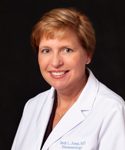Johns Hopkins
Uzma Haque, MD, assistant professor of medicine at Johns Hopkins, Baltimore, said she saw the need to improve the training of internal medicine residents on musculoskeletal (MSK) topics, an area in which students historically report low confidence and a lack of skill.
Professors at Johns Hopkins used a six-step approach to develop the curriculum, an approach first described several years ago. It involves identifying the problem and assessing needs, setting goals and more specific objectives within those goals, education strategies, implementation, evaluation and feedback. Each step feeds back into the other steps so the curriculum continues to improve, Dr. Haque said.
The curriculum was loaded into the Physician Education and Assessment Center, a national platform used by 294 internal medicine programs in the U.S., making it one of the most widely used such tools. When Dr. Haque started her project, there were only two MSK modules, one on back pain, and one on knee and hip pain.
A crucial factor is that the program features intrinsic improvement mechanisms; outcomes are measured and analyzed, and a module isn’t considered complete until students have formally provided feedback.
“There are built-in analytics to evaluate data and outcomes by year of training and by training programs,” Dr. Haque said. “In fact, there is an existing and functional PEAC [the Physician Education and Assessment Center] biostatistical team that helps us look at this information anytime we want to.”
Pre- and post-test scores showed statistically significant improvement. There were no significant differences in the pre- vs. post-test performance by year. But the knowledge gained was highest among postgraduate year 1 residents, Dr. Haque said, “suggesting such intervention should be implemented early in training and consolidated over the last two years of residency.
“Further studies are required to evaluate whether knowledge gained from this intervention is durable and translates into improved care for patients with MSK complaints,” she concluded.
Thomas R. Collins is a freelance writer living in South Florida.



